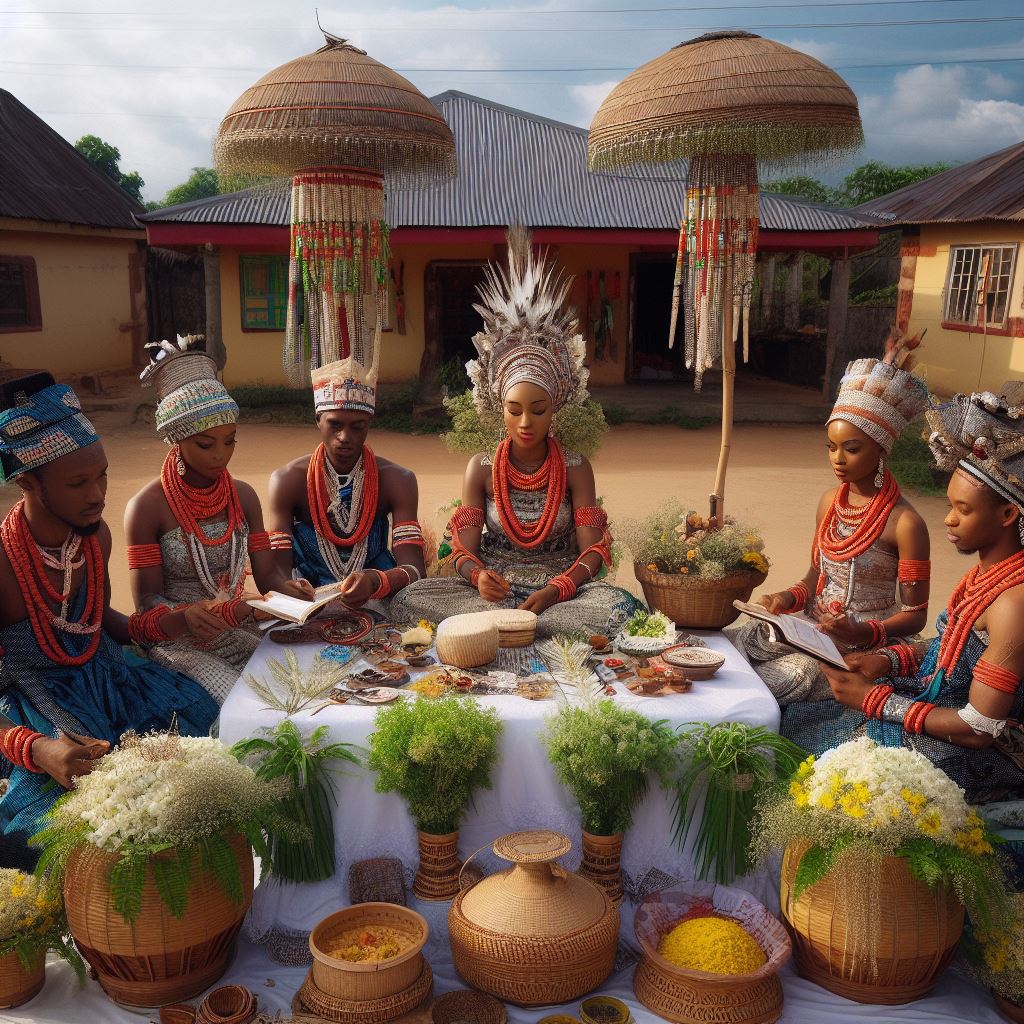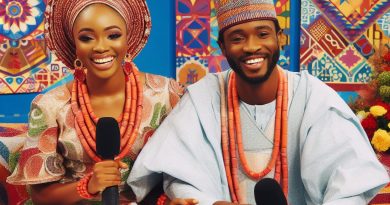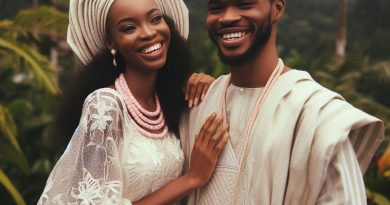Customizing Marriage Wishes for Each Nigerian Tribe
Last Updated on October 29, 2023
Introduction
A brief overview of the importance of marriage wishes in Nigerian culture
In Nigerian culture, marriage wishes hold great significance as they symbolize blessings and good fortune for newlyweds.
These wishes are often conveyed through spoken words, written messages, or traditional rituals.
Introduce the concept of customizing marriage wishes for each Nigerian tribe
To truly honor the diverse cultural heritage of Nigeria, the concept of customizing marriage wishes for each tribe has gained popularity.
Each tribe has its own unique traditions and beliefs, making customized wishes more meaningful and relevant.
Thesis statement: Exploring the significance and unique practices of customizing marriage wishes for different Nigerian tribes
In this section, we will delve into the importance of customizing marriage wishes for each Nigerian tribe, examining the specific rituals, blessings, and cultural practices that make these wishes so significant.
By understanding this, we can appreciate the depth and richness of Nigerian culture.
Understanding Nigerian Tribes
Brief explanation of the ethnic and cultural diversity in Nigeria
Nigeria is a country with incredible ethnic and cultural diversity.
It is home to more than 250 ethnic groups, each with its own distinct traditions and customs.
This diversity is a result of the country’s historical and geographical factors.
The three major ethnic groups in Nigeria are the Hausa-Fulani, Yoruba, and Igbo.
These groups, along with many others, contribute to the vibrant cultural tapestry of Nigeria.
A brief description of major Nigerian tribes
- Hausa-Fulani: The largest Nigerian tribe, primarily found in northern Nigeria.They are known for their rich cultural heritage, including their unique architecture, music, and cuisine.
- Yoruba: This tribe is predominantly located in southwestern Nigeria. They are famous for their vibrant festivals, traditional monarchies, and elaborate arts and crafts.
- Igbo: The Igbo people are mainly situated in southeastern Nigeria. They are known for their entrepreneurial spirit, Igbo language, masquerades, and traditional religion.
- Ijaw: This tribe is found in the Niger Delta region and is known for its fishing and farming traditions.
- Kanuri: Primarily located in northeastern Nigeria, the Kanuri are renowned for their mastery of trade and agriculture.
- Tiv: The Tiv people are mostly found in central Nigeria and are known for their farming and rich oral traditions.
Emphasize the variations in traditions, customs, and languages among these tribes
Each Nigerian tribe has unique traditions and customs that contribute to their distinct cultural identities.
For example, the Hausa-Fulani tribe practices Islam as its predominant religion, while the Igbo tribe mainly follows Christianity and traditional religions.
Moreover, there are significant linguistic differences among these tribes.
The Hausa-Fulani language belongs to the Afro-Asiatic family, while the Yoruba and Igbo languages are Niger-Congo languages.
These linguistic variations further contribute to the rich tapestry of Nigeria.
Additionally, various cultural practices such as marriage ceremonies, festivals, and art forms differ among the tribes.
For instance, the Yoruba tribe is famous for its colorful traditional weddings and the masquerade festival known as “Eyo.”
On the other hand, the Igbo tribe celebrates the “Iri Ji” festival, also known as the New Yam Festival, to mark the yam harvest.
These variations in traditions, customs, and languages showcase the incredible diversity of Nigerian tribes.
In essence, Nigeria’s ethnic and cultural diversity is a significant aspect of the country’s heritage.
The major Nigerian tribes, including the Hausa-Fulani, Yoruba, and Igbo, have their own unique traditions, customs, and languages.
Understanding and appreciating these diversities enriches our knowledge and appreciation of Nigeria’s cultural landscape.
Read: Yoruba, Igbo, Hausa: Anniversary Messages for Every Tribe
Importance of Marriage Wishes in Nigerian Culture
Highlight the significance of marriage wishes as a form of respect and blessings
Marriage wishes hold great importance in Nigerian culture, serving as expressions of respect and blessings towards the newly married couple.
They are considered essential to ensure a prosperous and blissful life together for the bride and groom.
By conveying heartfelt wishes, family members, friends, and community members show their love and support.
This act of extending marriage wishes also signifies a sense of unity among the Nigerian people.
Discussion on how marriage wishes reflect the values and beliefs of Nigerian society
Marriage wishes are not just a custom but a reflection of the core values and beliefs of Nigerian society.
They illustrate the importance placed on family, community, and cultural traditions.
They serve as a reminder to the couple of their heritage and the expectations associated with their union.
Through these wishes, Nigerians showcase their commitment to upholding their rich cultural heritage.
Explain the role of marriage wishes in fostering unity and community support
Marriage wishes play a significant role in fostering unity and strengthening community support.
They bring together people from various backgrounds, tribes, and social classes to celebrate the joyous occasion.
These wishes transcend personal relationships, promoting a sense of togetherness and oneness.
Marriage wishes also encourage community involvement, with members offering assistance and guidance to the newlyweds.
They create a support network, ensuring the couple has the necessary backing to navigate through married life.
Ultimately, marriage wishes hold immense value in Nigerian culture.
They serve as a conduit for love, blessings, and support, fostering a sense of unity and togetherness.
These wishes embody the respect and reverence Nigerian society has for the institution of marriage.
By adhering to customs and traditions, Nigerians ensure the preservation of their heritage for future generations.
The exchange of marriage wishes beautifully encapsulates the significance of weddings within Nigerian tribes.
It serves as a reminder of the values, beliefs, and sense of community that are at the heart of Nigerian society.
Read: Igbo Wedding Toasts: Blending Tradition & Modernity
Customizing Marriage Wishes for Each Nigerian Tribe
Yoruba Tribe
Traditional marriage wishes and prayers specific to the Yoruba tribe are deeply rooted in their culture.
Yoruba marriage wishes often include blessings for prosperity, fertility, and long-lasting love.
The Yoruba people have unique customs and rituals associated with their marriage wishes.
They place great importance on traditional ceremonies, such as the engagement and the exchange of dowry.
Yoruba marriage wishes often involve prayers to the gods and ancestors for a successful union.
They also incorporate symbolic gestures, such as the pouring of libations and the sharing of kola nuts.
The Yoruba tribe values unity and community, which is reflected in their marriage wishes and prayers.
These wishes not only bless the couple but also seek the support and well-wishes of their families and friends.
By customizing these wishes to fit the couple’s specific tribe, the Yoruba people honor their rich cultural heritage.
Igbo Tribe
Distinct marriage wishes and blessings are particular to the Igbo tribe in Nigeria.
Igbo marriage wishes often emphasize unity, love, and the couple’s commitment to each other.
Cultural practices and gestures, such as the breaking of kola nuts and the exchange of palm wine, are incorporated into Igbo marriage wishes.
Igbo traditional marriage wishes also seek the blessings of the ancestors and spirits for a blissful union.
Igbo weddings are typically vibrant and colorful, reflecting the tribe’s rich cultural heritage.
By personalizing the marriage wishes to the Igbo tribe, the couple showcases their pride in their cultural identity.
Igbo marriage wishes not only bless the couple but also invite the support and well-wishes of their community.
These wishes serve as a reminder of the importance of family, community, and cultural traditions in Igbo society.
Through these wishes, the Igbo people celebrate their heritage and pass down their customs to future generations.
Hausa Tribe
The Hausa tribe has its own set of traditional marriage wishes and greetings.
Hausa marriage wishes often focus on the happiness, prosperity, and well-being of the couple.
These wishes frequently mention the importance of respect, loyalty, and commitment in a marriage.
Hausa marriage wishes are deeply rooted in Islamic traditions and teachings, as the majority of the tribe practices Islam.
They often include references to the Prophet Muhammad and blessings from Allah for a blessed and successful union.
Islamic customs, such as the reading of Quranic verses and the exchange of wedding vows, are incorporated into Hausa marriage wishes.
Hausa weddings are known for their grandeur and elegance, with elaborate traditional attire and vibrant cultural performances.
The recitation of marriage wishes by family members and Islamic scholars is an integral part of the Hausa wedding ceremony.
By customizing the marriage wishes to the Hausa tribe, the couple acknowledges their cultural and religious background.
These wishes serve as a reminder of the couple’s faith, community, and the values they hold dear.
Ijaw Tribe
The Ijaw tribe has its own customary marriage wishes and expressions.
Ijaw marriage wishes often invoke the blessings of their deities and ancestors for a harmonious and prosperous union.
They emphasize the importance of love, trust, and respect in a marriage.
Ijaw marriage wishes also celebrate the uniqueness and beauty of the bride and groom.
Traditional rituals, such as the offering of palm wine and the performing of traditional dances, are incorporated into Ijaw marriage wishes.
By customizing the marriage wishes to the Ijaw tribe, the couple pays homage to their cultural heritage.
Ijaw marriage wishes not only bless the couple but also seek the support and good wishes of their community.
They serve as a reminder of the couple’s roots and identity, connecting them to their ancestors and traditions.
Through these wishes, the Ijaw people celebrate the richness of their culture and pass down their customs to future generations.
In general, each Nigerian tribe has its unique set of marriage wishes, prayers, and customs that reflect their rich cultural heritage.
Personalizing these wishes to the specific tribe not only honors their cultural identity but also showcases their pride in their heritage.
Whether it’s the Yoruba, Igbo, Hausa, or Ijaw tribe, marriage wishes serve as a reminder of the importance of family, community, and cultural traditions in Nigerian society.
Read: Yoruba Wedding: A Deep Dive into Traditional Toasts

Modern Trends in Customizing Marriage Wishes
Addressing the influence of globalization on marriage wishes in modern Nigerian society
Globalization has brought about cultural exchange, affecting the way marriage wishes are customized in Nigeria.
Nigerians are now incorporating elements from different cultures into their marriage wishes, resulting in diverse and unique messages.
The influence of globalization has allowed Nigerians to have a broader perspective on marriage wishes.
Marriage wishes now reflect a globalized society, embracing both traditional and contemporary values.
Discuss the emergence of personalized and creative marriage wishes
In recent years, there has been a rise in personalized marriage wishes tailored to the couple’s personality and interests.
Couples now express their individuality through customized marriage wishes, making them more special and heartfelt.
Personalized marriage wishes often include personal anecdotes, inside jokes, or references to the couple’s experiences.
Creative marriage wishes, such as poems, songs, or videos, have gained popularity as a way to convey well wishes in a unique and memorable manner.
Highlight examples of how technology and social media have impacted marriage wishes in Nigeria
Technology has made it easier to send and receive marriage wishes, with the rise of social media platforms like Facebook, WhatsApp, and Instagram.
Nigerians now share and exchange marriage wishes through online platforms, transcending geographical boundaries.
Social media has enabled friends and family members to publicly express their love and best wishes for the couple.
Hashtags and online campaigns dedicated to marriage wishes have become a popular trend, creating a sense of community and celebration.
Technology also allows for the creation of digital marriage cards, animated videos, and virtual reality experiences, enhancing the customization of wishes.
Generally, modern Nigerian society has witnessed various trends in customizing marriage wishes.
Globalization has influenced Nigerians to incorporate different cultural elements into their messages, resulting in unique and diverse wishes.
The emergence of personalized and creative marriage wishes allows couples to express their individuality and make wishes more special and heartfelt.
With these modern trends, marriage wishes in Nigeria now reflect a combination of tradition, personalization, creativity, and technological advancements.
Read: Hausa Wedding Traditions: Marriage Messages Explored
Conclusion
Recap on the significance of customizing marriage wishes for different Nigerian tribes
Customizing marriage wishes for each Nigerian tribe is highly significant as it shows respect for their diverse cultures.
Customized marriage wishes hold immense importance in Nigeria’s diverse cultural landscape. Each of the country’s numerous tribes carries distinct traditions, beliefs, and values, making personalization a necessity.
Yoruba weddings, for instance, emphasize rich symbolism and spirituality. Sending wishes that acknowledge these aspects reflects genuine respect for the couple’s heritage.
In Igbo weddings, kola nut ceremonies are central, signifying hospitality and unity. Tailoring your message to include these elements fosters a deep connection.
Hausa weddings showcase elegant attire and communal celebrations. A wish recognizing the elegance and communal spirit of the occasion resonates well with the couple.
The Niger Delta region boasts diverse tribes, each with unique customs. Acknowledging these specifics in your message demonstrates cultural sensitivity.
For the Kanuri people of northeastern Nigeria, simplicity and modesty reign supreme. A personalized wish that appreciates these values can be heartwarming.
Marriage in Nigeria is not just about the union of two individuals; it’s a celebration of cultural diversity. Customized wishes show your awareness of this significance, strengthening your bond with the couple.
The importance of cultural preservation and appreciation in this practice
It is important to preserve and appreciate these cultural practices in order to maintain the richness of Nigerian heritage.
Cultural preservation maintains our global heritage. It fosters identity, understanding, and unity among diverse groups.
Appreciating culture promotes respect and tolerance. Active engagement ensures traditions endure.
Sharing cultural experiences bridges societal gaps. Preserve, appreciate, and unite.
Encouragement to readers to embrace diversity and learn more about Nigerian tribes’ customs in marriage wishes
Overall, I encourage readers to embrace diversity and take the initiative to learn more about the customs and traditions of Nigerian tribes when it comes to marriage wishes.
Embracing diversity enriches our perspectives. Nigeria boasts numerous tribes, each with unique marriage wishes.
Delving into these customs deepens understanding and connection. The Igbo tribe cherishes blessings for fertility.
Yoruba people emphasize lasting love and unity. Hausa tribes wish for prosperity and longevity in marriage.
By understanding these wishes, we celebrate Nigeria’s rich tapestry. This exploration fosters mutual respect.
By appreciating tribal nuances, we bridge cultural divides. Let’s champion Nigeria’s rich traditions.
Dive deep; honor each tribe’s marital blessings. Remember, diversity is strength. Embrace, learn, and grow.


